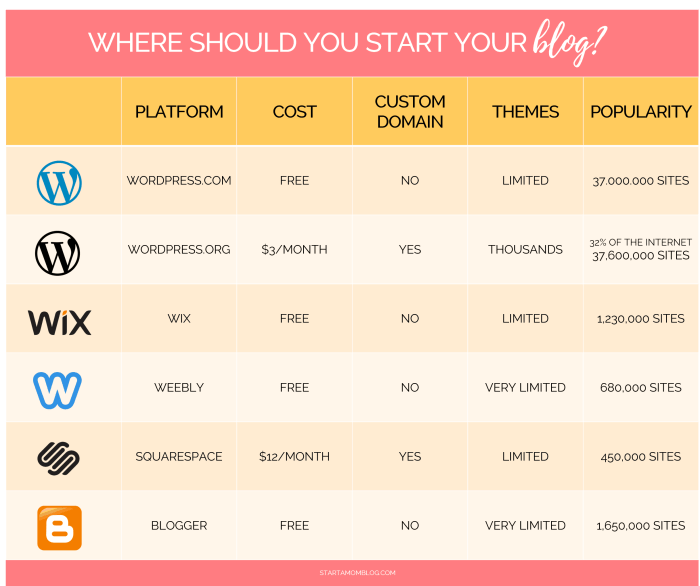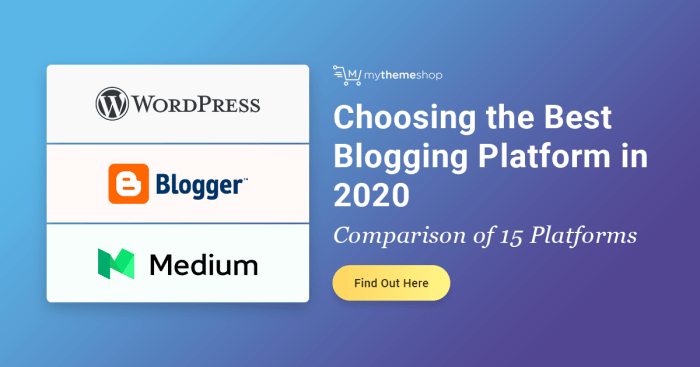Kicking off with Best Blogging Platforms, this topic dives into the world of blogging platforms, exploring the key factors to consider when selecting the best one for your blog. From customization options to monetization capabilities, get ready to discover the platform that suits your blogging goals.
Introduction to Blogging Platforms

A blogging platform is a software or service that allows individuals to create and manage their own blogs on the internet. It provides the tools and features necessary to publish content, customize the look and feel of the blog, and interact with readers.
Choosing the best platform for your blog is crucial for its success. The platform you select will impact the overall user experience, the functionality of your blog, and its potential for growth. It is essential to carefully consider your needs and goals when deciding on a platform.
The Importance of Selecting the Right Platform
When selecting the right platform for your blog, you are essentially setting the foundation for its success. The platform will determine how easy it is to create and publish content, how your blog looks and functions, and how you can engage with your audience.
- Customization: A good platform should offer a range of customization options to help you create a unique and visually appealing blog.
- optimization: Choose a platform that is -friendly to increase the visibility of your blog in search engine results.
- Community and support: Look for a platform that has an active community of users and provides reliable support to help you troubleshoot any issues that may arise.
- Monetization options: If you plan to monetize your blog, consider a platform that offers various monetization options such as ads, sponsorships, or selling products.
Popular Blogging Platforms
When it comes to choosing a platform for your blog, there are several popular options to consider. Each platform has its own set of features, pros, and cons that cater to different needs and preferences. Let’s take a closer look at some of the top blogging platforms available:
WordPress
WordPress is one of the most widely used blogging platforms in the world. It offers a user-friendly interface, customizable themes, and a wide range of plugins to enhance functionality. Some key features of WordPress include:
– Easy to use interface for beginners
– Extensive plugin library for customization
– -friendly features for better visibility
– Regular updates and support from a large community
However, some drawbacks of WordPress include the need for regular maintenance and updates, which can be time-consuming. Additionally, advanced customization may require technical knowledge.
Blogger
Blogger is another popular choice for bloggers, especially for beginners. It is owned by Google and offers seamless integration with other Google services. Key features of Blogger include:
– Simple and easy-to-use interface
– Free hosting by Google
– Integration with Google AdSense for monetization
– Built-in analytics for tracking blog performance
On the downside, Blogger has limited design options compared to other platforms. It also lacks advanced customization features for more experienced users.
Medium, Best Blogging Platforms
Medium is a unique platform that focuses on quality content and storytelling. It offers a clean and minimalist design, making it ideal for writers and journalists. Some key features of Medium include:
– Built-in audience for increased visibility
– Seamless publishing experience
– Clap feature for reader engagement
– Curated collections for showcasing content
However, Medium has limited customization options compared to other platforms. It also has restrictions on monetization and ownership of content.
In conclusion, each blogging platform has its own strengths and weaknesses, catering to different needs and preferences. It’s essential to consider your goals and requirements before choosing the platform that best suits your blogging style.
Customization and Design Options

When it comes to creating a unique and visually appealing blog, customization and design options play a crucial role. Different blogging platforms offer various features that allow users to personalize their blogs according to their preferences. Let’s dive into the details of customization and design options available on popular platforms.
WordPress
WordPress is known for its extensive customization options, making it a favorite among bloggers. Users can choose from thousands of themes, both free and premium, to change the look and feel of their blogs. Additionally, WordPress allows users to customize layouts, fonts, colors, and even add custom CSS for more advanced design changes.
Blogger
Blogger, owned by Google, also offers some customization options for users. While the platform may not be as flexible as WordPress, users can still choose from a variety of templates and customize elements like colors, fonts, and layouts. Users can also add custom CSS to further personalize their blogs.
Wix
Wix is a drag-and-drop website builder that provides a high level of customization for bloggers. Users can choose from hundreds of templates and easily customize them to create a unique look for their blogs. Wix also offers a wide range of design elements, such as animations, effects, and interactive features, to enhance the visual appeal of the blog.
Medium, Best Blogging Platforms
Medium, a popular platform for writers, offers a clean and minimalist design that focuses on content. While customization options on Medium are limited compared to other platforms, users can still customize their profiles, add cover images to their posts, and change the font styles to match their preferences.
Squarespace
Squarespace is known for its beautiful and professional design templates that are perfect for bloggers looking for a polished look. Users can customize these templates by changing colors, fonts, layouts, and adding custom CSS. Squarespace also offers a wide range of design tools to create a visually stunning blog.
User-Friendliness and Ease of Use
When it comes to blogging platforms, user-friendliness and ease of use are crucial factors to consider. A platform that is intuitive and simple to navigate can make the process of setting up a blog and publishing content much smoother for both beginners and advanced users alike.
User Interface and Navigation
- Look for a platform with a clean and organized user interface that makes it easy to find the tools you need.
- Ensure the platform offers straightforward navigation menus and clearly labeled buttons for essential functions.
- Test out the platform’s dashboard to see if it is user-friendly and intuitive for managing your blog.
Setting Up a Blog
- Choose a platform that offers easy setup options, such as guided tutorials or step-by-step instructions.
- Consider platforms that provide pre-designed templates for quick customization without the need for coding skills.
- Look for platforms with drag-and-drop editors that allow you to easily arrange and customize your content.
Publishing Content
- Opt for a platform that simplifies the process of creating and publishing blog posts with a user-friendly editor.
- Check if the platform supports various media types, such as images, videos, and embedded content, for a dynamic blog experience.
- Explore the platform’s scheduling and drafting features to streamline your content creation process.
Tips for Selecting a Platform
- Consider your level of expertise and choose a platform that aligns with your skills, whether you’re a beginner or an experienced blogger.
- Read user reviews and recommendations to gauge the user-friendliness and ease of use of different platforms.
- Take advantage of free trials or demo versions to test out the platform’s usability before committing.
Monetization Options
When it comes to making money from your blog, choosing the right platform with the right monetization options is crucial. Let’s explore how different platforms support monetization through ads, affiliate marketing, or selling products, and provide insights on selecting a platform that aligns with your goals.
Ads
- Many popular blogging platforms offer built-in ad networks that allow you to display ads on your site.
- You can also integrate third-party ad networks like Google AdSense to generate revenue based on clicks or impressions.
- Consider the placement and design of ads to ensure they are not intrusive to your readers but still effective in generating income.
Affiliate Marketing
- Some platforms provide tools to easily incorporate affiliate links into your content, allowing you to earn a commission for promoting products or services.
- Choose a platform that supports affiliate marketing with tracking capabilities to monitor the performance of your affiliate links.
- Focus on promoting products that align with your niche and audience to maximize your earnings.
Selling Products
- If you plan to sell products or services directly through your blog, opt for a platform that offers e-commerce integration.
- Look for features like secure payment gateways, inventory management, and customizable storefronts to enhance the shopping experience for your customers.
- Create compelling product descriptions and high-quality images to attract potential buyers and drive sales.
Community and Support: Best Blogging Platforms
Building a strong community and having reliable support are essential components of a successful blogging platform. The ability to connect with other bloggers and receive assistance when needed can greatly enhance the overall blogging experience.
Support Resources
- WordPress: WordPress offers extensive support resources such as forums, documentation, and tutorials. Users can also reach out to the community for help and advice.
- Blogger: Blogger, owned by Google, provides support through their Help Center, community forums, and official blog. Users can find answers to common issues and connect with other bloggers.
- Wix: Wix offers 24/7 customer support via phone, email, and live chat. Users can also access their knowledge base and community forum for additional assistance.
Blogger Communities
- WordPress: WordPress has a vibrant community of bloggers who interact through forums, meetups, and social media groups. Users can share tips, collaborate on projects, and support each other’s work.
- Blogger: Blogger users can connect with fellow bloggers through the platform’s official blog, forums, and social media channels. It’s a great way to network and build relationships within the community.
- Medium: Medium fosters a sense of community among writers and readers through its commenting system and publications. Users can engage with each other’s content and provide feedback.
and Analytics Integration
When it comes to running a successful blog, (Search Engine Optimization) and analytics play a crucial role in driving traffic, understanding audience behavior, and optimizing content for better visibility.
Integration
Effective integration is essential for ensuring that your blog ranks well on search engine results pages. Here are some key points to consider:
- Choose a platform that allows you to customize meta tags, URLs, and headings for each post.
- Ensure the platform provides options for creating -friendly permalinks and sitemaps.
- Look for built-in tools or plugins that help optimize content for specific s and phrases.
Analytics Integration
Analytics tools provide valuable insights into your blog’s performance, audience demographics, and popular content. Here are some tips for selecting a platform with robust analytics integration:
- Opt for a platform that offers seamless integration with popular analytics services like Google Analytics.
- Look for built-in analytics features that track page views, user engagement, and referral sources.
- Consider platforms that allow you to set up custom tracking codes for advanced analytics tracking.